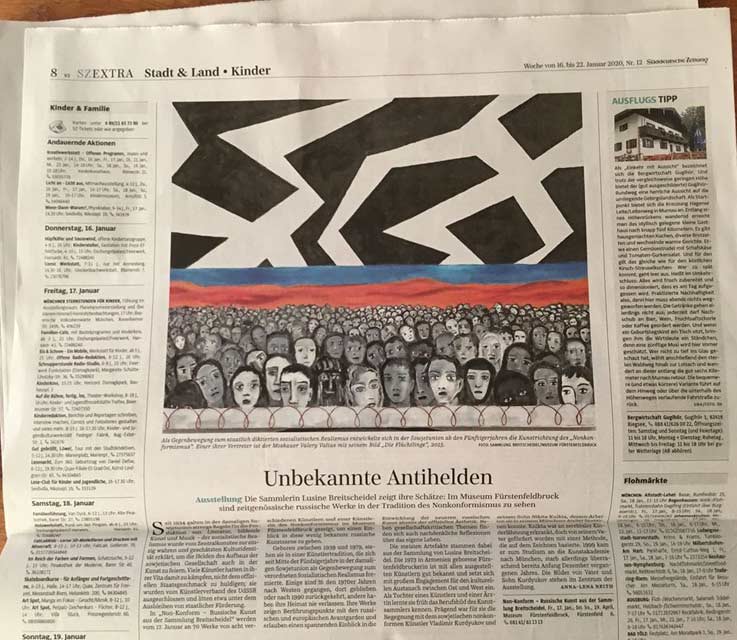|
|
Züddeutsche Zeitung, №2, January, 2020.
Anna Lena Wright

As a movement opposite the socialist realism prescribed by the state, non-conformism arose in the Soviet Union in the 1950s. The picture “Refugees” (2015) by the Moscow artist Valery Valius from the Breitscheidel collection in the Fürstenfeldbruck Museum can give an idea of it.
Unknown antiheroes.
The exhibition of collector Lucine Breitscheidel shows wonderful paintings from her collection: at the Fürstenfelbruck Museum you can see the works of contemporary Russian nonconformist artists.
Since 1934, the Soviet Union had strict rules for works in the fields of literature, art and music - socialist realism. The Central Committee of the CPSU declared it the only true and recognized direction of culture, designed to glorify the heroes of the construction of Soviet society. Many artists had to fight not to bow down to state tastes; they were expelled from the Union of Artists of the USSR and deprived of state support.
At the exhibition Nonconformism - Russian Art from the Breitscheidel Collection from 70 January, 70 works by eight men and one woman will be shown to give an idea of this little-known direction in Russian cultural life.
Born between 1939 and 1979, they continue the tradition that was formed in the then Soviet Union as a confrontation with prescribed socialist realism. Some of them left for the West in the 70s and remained there, some returned to their homeland after 1990, others never left their country. Their work echoes the Russian and European avant-garde and allows you to cast an interested look at the new development of Russian art outside the official framework. In addition to a critical description of social life, there are also deep thoughts about themselves.
Mostly presented are works from the collection of Lucine Breitscheidel. She was born in 1973 in Armenia, now lives in Fürstenfeldbruck, is well acquainted with all the artists exhibited and is actively working in the field of cultural exchange between East and West. The daughter of an artist and a doctor, she early became acquainted with the profession of a collector.
Decisive for her was a meeting with the Soviet non-conformist artist Vladimir Kurdyukov and his son Nikita Knikta, whose work she could marvel at in his Munich studio. Knikta was ill with cerebral palsy, but his father supported him with his own technique based on drawing. In 1999, he came to Munich to study at the Academy of Arts, but he suddenly died in early December last year. Pictures of the father and son Kurdyukov make up the central part of the exhibition.
Nonconformism - Russian art from the Breitscheidel collection from Friday January 17 to Saturday April 19, Furstenfeldbruck Museum, Furstenfeld 6, tel. 08143/611313